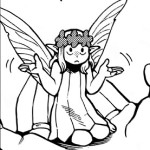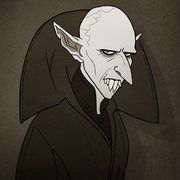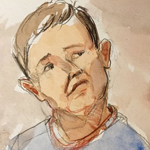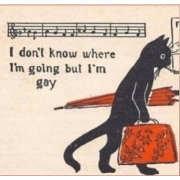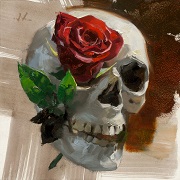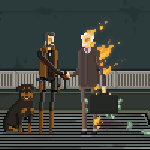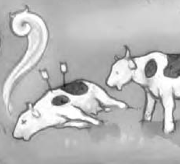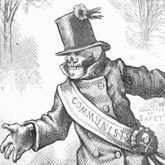|
Cobalt-60 posted:Has anyone ever run into a case of dwarves being depicted as jews, besides Tolkien's footnotes? Every dwarf I've ever run into has been some version of "Beardy McDrunk", "Hammer McSmash," or "Gruff McStone;" those are the stereotypes I associate with dwarves. (How did dwarves become scottish stereotypes?) Eberron has run afoul of it, with the dwarves of the Mror Holds being powerful bankers across the continent of Khorvaire (thanks originally to the mineral wealth of the Holds that most of the rest of the continent needs, but now as its own self-sustaining business). Plus there's a secret rich person's club known as the Aurum that originated with the dwarves, with its own conspiratorial designs on power. This was apparently entirely unintentional, especially as basically everyone has some secret conspiracy grasping at power somewhere in the woodwork, and the Aurum is long since not a dwarf-exclusive club. I don't know what official word is, but I feel like they were also meant to be more like the Florentine Republic, with the powerful dragonmarked House Kundarak meant to invoke magically-gifted Medicis. Just, well, what you aim for and what you hit isn't always the same thing.
|
|
|
|

|
| # ? May 23, 2024 22:07 |
|
Insatiable greed for gold shows up in Norse mythology.
|
|
|
|
The ongoing Warhammer battle for Karak Eight-Peaks is between three factions, each of which I've been told are Jewish stand-ins. I think it's more that the Jews have been vilified since vilifying people was a thing. Whenever anything's bad about any fictional culture, there's a corresponding piece of antisemitism to go with it.
|
|
|
|
Well, yes, but that’s hardly the FUNNY explanation for it, is it?  disposablewords posted:Eberron has run afoul of it, with the dwarves of the Mror Holds being powerful bankers across the continent of Khorvaire (thanks originally to the mineral wealth of the Holds that most of the rest of the continent needs, but now as its own self-sustaining business). Plus there's a secret rich person's club known as the Aurum that originated with the dwarves, with its own conspiratorial designs on power. This was apparently entirely unintentional, especially as basically everyone has some secret conspiracy grasping at power somewhere in the woodwork, and the Aurum is long since not a dwarf-exclusive club. Weren’t gnomes like big into spying in Eberron too? That one at least is harder to call unfortunate implications on, since as I recall it was less “secret racial conspiracy” and more “Moscow rules spy scenario bait” (they had a KGB equivalent and everything).
|
|
|
|
Cobalt-60 posted:Insatiable greed for gold shows up in Norse mythology.
|
|
|
|
MadDogMike posted:Well, yes, but that’s hardly the FUNNY explanation for it, is it? The funny explanation is that Drizz't is really just that bad at ranger things, and never noticed until someone else pointed it out years later.
|
|
|
|
moths posted:The ongoing Warhammer battle for Karak Eight-Peaks is between three factions, each of which I've been told are Jewish stand-ins. That's a lie. Skaven are nazis and orcs are football hooligans.
|
|
|
|
Nature vs. nurture arguments in fantasy games ignore the third and fourth options of gods and magic. If a type of creature is made by a wizard and/or god to act a certain way, they're literally wired to be that way. Weird, short-sighted, dumb, or unfair, those matter not; gods got their own plans, man. At least this is how it's hand-waved in most systems so you can go push someone's poo poo in like an action movie hero without feeling bad about it. There's no catharsis in worrying about whether that orc had a family.
|
|
|
|
Mirage posted:Nature vs. nurture arguments in fantasy games ignore the third and fourth options of gods and magic. If a type of creature is made by a wizard and/or god to act a certain way, they're literally wired to be that way. Weird, short-sighted, dumb, or unfair, those matter not; gods got their own plans, man. Isn't that just the "nature" argument? nature vs nurture was definitely a thing before everyone was an atheist.
|
|
|
|
Owlofcreamcheese posted:Isn't that just the "nature" argument? Not to get too far afield, but I dunno if Goddidit was ever a deliberate part of that particular argument. Especially not polytheistic Goddidits all fighting each other. Also nature vs. nurture will never account for perytons.
|
|
|
|
MadDogMike posted:Weren’t gnomes like big into spying in Eberron too? That one at least is harder to call unfortunate implications on, since as I recall it was less “secret racial conspiracy” and more “Moscow rules spy scenario bait” (they had a KGB equivalent and everything). Yeah, the gnomes of Zilargo basically use secret police, called the Trust. They culturally value intelligence and control of information, far more than they do force. It's generally attributed to them being caught between an expansionist (at the time) human kingdom to the north and west, and a saber-rattling declining hobgoblin state to the east. So their solution, as a small (hah) population without much materiel means to make war, was to throw in with the humans and make themselves valuable as informants in the region. Like with many things in Eberron, the bits are present to have a deeper reading where clearly there's something incredibly scary to be a common gnome living in a state that constantly practices espionage on its own people as a matter of accepted policy. But you can also just accept the surface-level reading where it's just some quirky trait of a relatively non-violent people (because they live surrounded by very tall people who are WAY better than them at violence), as an excuse for the niche they occupy. That said, really everyone in Eberron is big into spying. It's shortly after a major war and everybody in power is jockeying for any advantage for the next one. The gnomes have the Trust and the dwarves have the Aurum, but the dragons have the Chamber, demon lords have the Lords of Dust, the various dragonmarked houses have their own agents, Breland (generically Good kingdom) has the King's Dark Lanterns (CIA ratfuckers), and so on. There's a conspiracy everywhere, which I feel helps disarm a little bit of the stereotypes hanging on the gnomes and dwarves.
|
|
|
|
lightrook posted:The funny explanation is that Drizz't is really just that bad at ranger things, and never noticed until someone else pointed it out years later. OK, given that the ranger who trained him was blind, I think we have the answer!
|
|
|
|
MadDogMike posted:So naturally the writers of the D&D setting made sure to destroy said orc kingdom in practically a footnote in 5E Forgotten Realms. Can't have any interesting changes now, can we? Guen's canonically been a female for many years and many books prior to The Thousand Orcs, so it sounds like there were some minor copyediting problems in the copy you read. (The current copy I have is one of the reprints so they may have fixed it.)
|
|
|
|
moths posted:The ongoing Warhammer battle for Karak Eight-Peaks is between three factions, each of which I've been told are Jewish stand-ins. Yeah that one is nonsense. For example, Skaven (which are rat people) are very very obviously Nazis.
|
|
|
|
Chuds say they're jews, for obvious chud reasons.
|
|
|
|
They are cute rat friends
|
|
|
|
Well, according to the important documentary source, The Vile Ratmen and all their Loathsome Kin...
|
|
|
|
Telsa Cola posted:Yeah that one is nonsense. For example, Skaven (which are rat people) are very very obviously Nazis. Maybe I'm just dumb, but I don't really see it. The only constant I could really point to in the incoherent garbage of fascism is the existence of a centralizing Dear Leader, which is definitely NOT the case with our pals the rats. I personally agree with the interpretation that the rats are a fantasy cyberpunk hyper-capitalism, with the complete lack of any kind of unifying ideology and the total oppression of every facet of life of the weak by the strong. The whole rat-eat-rat, stab any back turbo-individualist philosophy feels kind of brutally modern. Fake edit: unless they're significantly different in AoS maybe? In which case I wouldn't know.
|
|
|
|
An irrational cult that worships a prelapsarian past and the idea of heroic death and sacrifice for the good of a racial cause that feels itself above other races/communities, obsessed with plots, machismo and over-complicated superweapons to be used to enslave and genocide persecuted others, all of this fueled by intense internal conflict pitting equals against each other in order to rise to the top. And they talk funny. Exactly how much more explicit do you need your Nazi comparisons, guys? Do they have to twist their tails into little swastikas? loving yeah, the Skaven are Rats-ional Socialists.
|
|
|
|
The authorities also deny the existance of the skaven despite their ubiquitous nature and constantly exposed attempts to undermine society. Orcs are Americans actually.
|
|
|
|
Arivia posted:Guen's canonically been a female for many years and many books prior to The Thousand Orcs, so it sounds like there were some minor copyediting problems in the copy you read. (The current copy I have is one of the reprints so they may have fixed it.) Like I said, literally the first book (The Crystal Shard) and it's in a few places. The Crystal Shard pg. 155 posted:"I have something that may aid us." The drow pulled his pack from his back and took out the small figurine and called his shadow. When the wonderous feline abruptly appeared, the barbarian gasped in horror and leaped away. The Crystal Shard pg. 164 posted:The drow never slowed as he passed, gouging his scimitar into the throat of one of the powdered verbeeg and then rolling backward over the top of the wooden table. Gwenhwyver sprang on the other giant, his powerful jaws tearing out the monster's groin. The Crystal Shard pg. 169 posted:The giant advanced on Drizzt. "Arg, hold yer ground, ye miserable rat!" it growled. "An' none o' yer sneaky tricks! We wants to see how ye does in a fair fight." Anyway, you get the idea. Interestingly enough on review I noted a lot of times Gwen got tagged with "it" instead, as well as several other individuals like the giant here. So even within the book itself the pronoun usage was kind of inconsistent, much less the series. My copy is the 1988 print, so it may indeed be older than yours and they corrected things on reissue though. I just noticed the shift as the series went on and thought it was funny. Anybody remember any other books that mixed up their pronouns like that, tabletop related or not?
|
|
|
|
Randarkman posted:That's a lie. Skaven are nazis and orcs are football hooligans. Skaven are obviously nazis, yes. But the case for them being antisemitic tropes has been made right here on these very forums. Orcs are just brutal hooligans, but Karak Eight-Peaks is goblins, and I've seen that argument made more than the dwarf one.
|
|
|
|
I feel like this thread is converging on a theory that if someone tries to make up a fantasy race that is meant to be bad it’s going to fall on a spectrum of either being like nazis or being like things nazis said various groups were like.
|
|
|
|
Owlofcreamcheese posted:I feel like this thread is converging on a theory that if someone tries to make up a fantasy race that is meant to be bad it’s going to fall on a spectrum of either being like nazis or being like things nazis said various groups were like. G'oddwynn's Lore
|
|
|
|
Xiahou Dun posted:An irrational cult that worships a prelapsarian past and the idea of heroic death and sacrifice for the good of a racial cause that feels itself above other races/communities, obsessed with plots, machismo and over-complicated superweapons to be used to enslave and genocide persecuted others, all of this fueled by intense internal conflict pitting equals against each other in order to rise to the top. It should be noted that the Skaven are more nazis in the pulp adventure serial context. Maybe specifically the secretly hiding in South America type. They believe themselves to be the master race and scheme and come up with zany plans and evil research that combines super science and occult magic, they've got the highly recognizable and simple and obviously evil-looking symbol and their elite troops are "stormvermin". e: Also worth noting that not everything about a fantasy race or culture has to be an exact allegory or parallel of something in the real world or history, you can easily have numerous deviations or inconsistencies. Skaven are nazis in a broad, and I think, pulp fiction sense. Randarkman fucked around with this message at 07:28 on Nov 12, 2021 |
|
|
|
Randarkman posted:It should be noted that the Skaven are more nazis in the pulp adventure serial context. Maybe specifically the secretly hiding in South America type. They believe themselves to be the master race and scheme and come up with zany plans and evil research that combines super science and occult magic, they've got the highly recognizable and simple and obviously evil-looking symbol and their elite troops are "stormvermin". Most of the important ones are also doing lots of
|
|
|
|
Also the whole The Great Horned Rat is the racial ideal of Skaven and those showing the corresponding traits matching TGHR are held in higher esteem.
|
|
|
|
Their direct nazi inspiration is nazi skinhead gangs in the GB of the original GW writers' era, not the guys invading Russia in Hugo Boss. Half of warhammer races are assorted football hooligans. The high elves would absolutely vote for Ulthuexit and then complain that they can't live in Estalia anymore.
|
|
|
|
Edgar Allen Ho posted:The high elves would absolutely vote for Ulthuexit and then complain that they can't live in Estalia anymore. This is basically just the War of the Beard.
|
|
|
|
Shrecknet posted:insatiable greed for gold also shows up IRL hth Yeah, who could imagine a society where the lust for riches by the leaders leads to devastation of their biome! *mops brow nervously* disposablewords posted:Like with many things in Eberron, the bits are present to have a deeper reading where clearly there's something incredibly scary to be a common gnome living in a state that constantly practices espionage on its own people as a matter of accepted policy. Hah-ha, who can imagine that! *profuse sweating*
|
|
|
|
Hey, would just like to thank this thread for selling me on Lancer and Root. I'd been aware of both properties, but until reading this thread had not had a reason to look into either. This thread gave me those reasons. For Lancer, it was the NHPs. Oh man. Cascading, eidolons, paracausality, RA; all that is 1009% my poo poo. And in the process of digging in to the background for those elements, I discovered what has quickly becoming my favourite sci-fi setting since the Culture books. Alongside that, Lancer has reignited my love of mechs. (Indeed my one disappointment is that there is no line of miniatures for me to paint, cos man do I have a hankering to do so now; TPM's designs are just soooo good.) For Root, it was discovering the existence of the Underground Monarchy. I have a life-long love of moles, and the art and flavour for the moles in Root utterly delighted me. I mean basically, any game where you can play a mole, I play a mole, but in very few games do I get that opportunity. I love the Duchy to bits, and am now after my own set. (I was going to buy the Steam game until I discovered that it didn't have the Underground Duchy. And, like, no mole, no moolah.
|
|
|
|
MadDogMike posted:Like I said, literally the first book (The Crystal Shard) and it's in a few places. Apparently he's addressed this often: quote:In The Collected Stories: The Legend of Drizzt Anthology, R.A. Salvatore explained that while writing The Crystal Shard, he was told by TSR that magical items could not have a gender, despite his arguments otherwise. To his "horror," he later discovered after the book was published that some of the more awkward uses of "it" were changed — presumably by a copyeditor — to the male pronoun. Salvatore has subsequently responded to hundreds of letters from fans explaining this.[21] For example, on page 182 of The Crystal Shard (of The Icewind Dale Trilogy Collector's Edition) and page 155 of the first printing of The Crystal Shard trade paperback: When in doubt, blame the editor 
|
|
|
|
Since Root got mentioned again, I’ll go ahead and post this excellent ongoing series about the game as viewed through the lens of Foucault and bio-politics Part 1 introduces Foucault and puts forward the idea that the suited cards represent citizens within each faction Part 2 discusses Power and theorizes a new timeline of events in the background of Root Part 3 is still only on Patreon, but it finally dives into the Marquis de Cat and the Woodland Alliance: what they represent and how well they represent it. I’ll quote it without pictures here quote:Foucault in the Woodland, Part Three: Devouring Your Children
|
|
|
|
|
dingo with a joint posted:For Root, it was discovering the existence of the Underground Monarchy. I have a life-long love of moles, and the art and flavour for the moles in Root utterly delighted me. I mean basically, any game where you can play a mole, I play a mole, but in very few games do I get that opportunity. I love the Duchy to bits, and am now after my own set. (I was going to buy the Steam game until I discovered that it didn't have the Underground Duchy. And, like, no mole, no moolah. If you can, it's worth looking at the Tabletop Simulator mod, which includes all the expansions. It also worth checking out some of the fan factions, which are still interesting even if they may lack some of the depth of thought put into them. Sure, maybe the newspaper reporter frog faction or the charitable monastic order faction may have some kind of worthwhile commentary, but other factions just get carried away with their concept, like Fangus Khan, the giant snake that eats other faction's pawns, or Old Man Tinker, the vagabond who apparently traveled back in time from an apocalyptic future from when the forest has been turned into a blasted wasteland, and now he needs to right the wrongs of the original timeline with his robots (they even made a custom map of that apocalyptic wasteland forest with water rationing mechanics). The way that the original game makers support Print and Play really inspired a lot of people to make their own stuff.
|
|
|
|
Fuschia tude posted:When in doubt, blame the editor Heh, not surprising really. Although the bit about TSR claiming intelligent magic items having no gender intrigues me; trying to recall if there's any exceptions in real world legends/mythology/fantasy fiction to that. Only talking blade that jumped to my mind immediately was Turin's sword, which I'm pretty sure only identified as bloodthirsty.
|
|
|
|
MadDogMike posted:Heh, not surprising really. Although the bit about TSR claiming intelligent magic items having no gender intrigues me; trying to recall if there's any exceptions in real world legends/mythology/fantasy fiction to that. Only talking blade that jumped to my mind immediately was Turin's sword, which I'm pretty sure only identified as bloodthirsty. Durendal and oliphant are masculine, in the sense that the poem is in French so they kind of have to be gendered. You could probably make a decent argument that’s just a language quirk. Hindu mythical weapons are frequently gendered, but they’re also overtly people who can like walk around and do stuff, so that could sort of be the opposite of the French examples. Anything Chinese written before the Baihua movement could be as gendered as all hell and we’d never know because there was no grammatical markers for it* and the modern “he”, “she”, “it” distinctions hadn’t been made up yet. Actually, now that I’m mentally running through it, I can’t think of another language that does that kind of nonsense that English does. I know Arabic can have verbal agreement with feminine referents (like actually are women, not like German or French where we pretend hats are dudes), so that might be a natural place to check. *Important note : gender in the linguistic sense isn’t gender as in the common use most of the time : it’s another reflex of the same root as “genre” and just means a group of nouns that pattern the same in terms of the grammar. The name is confusing because some European languages (e.g. Spanish) have ones like masculine and feminine. Chinese has gender too, it’s just that the groups are things like “is a flat object”, “is an animal” or “is a handheld object”. As a German speaker, I promise you we don’t think bridges are girls : it would be very silly to do so because girls actually have neuter gender. :
|
|
|
|
Randarkman posted:Are the runes the Dwarves in Tolkien use even supposed to be Dwarven runes? There are many examples of runes and letters and such in those works, and alot or most of them are Elvish I think. The runes used by the dwarves are Cirth, which were an Elvish invention but really well-suited for engraving in stone and metal, so the dwarves took to them readily and IIRC by the Third Age were pretty much the only folks still using them.
|
|
|
|
Shrecknet posted:it's also interesting because if you think about it, in our world gods operate on faith. Jumping multiple pages back, but in at least one setting if you didn't worship any of the gods at all you ended up turned into a brick when you died so you could be placed in a wall with your other faithless fellows.
|
|
|
citybeatnik posted:Jumping multiple pages back, but in at least one setting if you didn't worship any of the gods at all you ended up turned into a brick when you died so you could be placed in a wall with your other faithless fellows. Apparently that was set up by the forgotten realms version of the Reaper, a former human turned thaumaturge and the crummy kind of Malevolent Death instead of the more modern sympathetic/overworked Death.
|
|
|
|
|

|
| # ? May 23, 2024 22:07 |
|
Triskelli posted:Apparently that was set up by the forgotten realms version of the Reaper, a former human turned thaumaturge and the crummy kind of Malevolent Death instead of the more modern sympathetic/overworked Death. It’s really unclear. There’s an offhand mention in the Avatar Series book 4 or 5 that the “current” system of the afterlife was created around when Myrkul (your Reaper) came to power, but specifically who did it or why isn’t stated. What is clear is that trying to undo it like Kelemvor (your overworked Death) makes everything break, really really quick. The Wall of the Faithless is basically the theological (NOT thematic) equivalent to Christian Hell - believe in a God or face eternal suffering for not doing your part.
|
|
|



